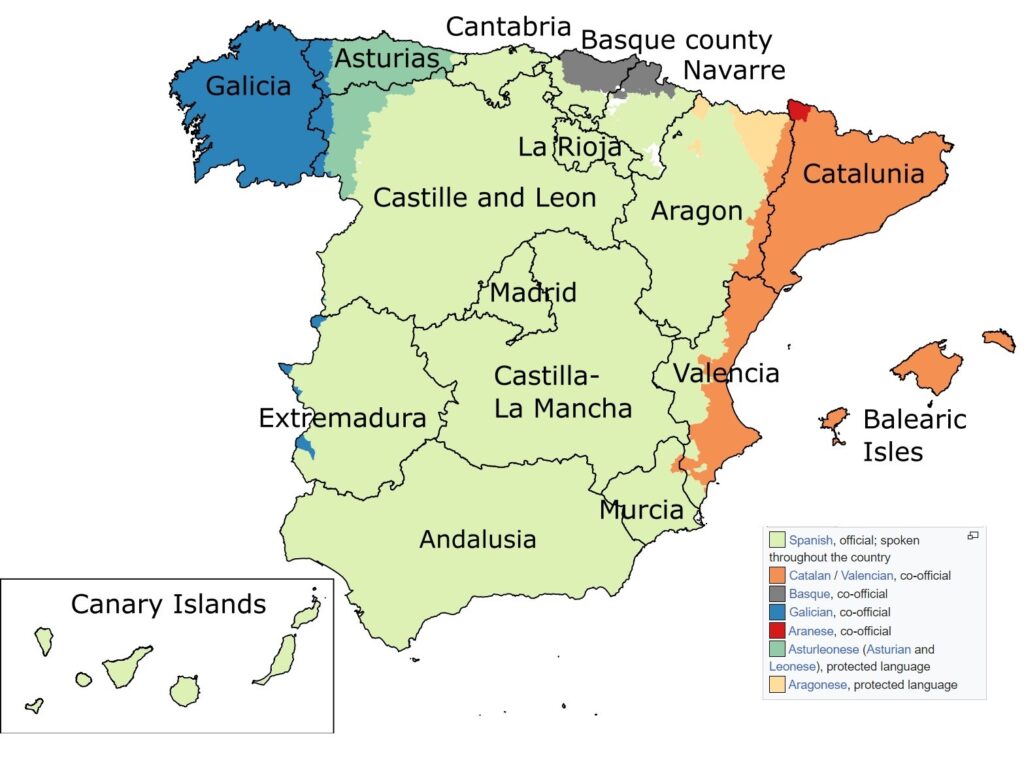| This page contains affiliate links. This means I may receive a small commission if you click on them or use the services they provide, at no extra cost to you. Check our Affiliate Disclaimer here. |
When moving to Spain, particularly to the Costa del Sol, do you need to learn Spanish? Well, I’d love to tell you that you can get by in Spain with only English, but that would be a lie. I do speak Spanish, but Hubby doesn’t, so every time we interact with a local, my first question is ¿Hablas Inglés? (Do you speak English?) which they often answer with a no (no😊) or solo un poco (just a little)… I then explain that I’ll do the translation and they gladly agree. That’s how I know that getting by without speaking Spanish would be hard.

In the police (where we made NIE and residence papers) they didn’t speak English, and that was why they allowed me to accompany Hubby in the process (as a translator). The local moving company, the car dealership, the people that did renovations in our new home, none of them spoke English, and neither did the doctor, most of the ubers or our kid’s teacher. Waitress and hotel receptionists, though, may speak a good English. Therefore, if you came on vacation and are basing the general language skills of the locals on that experience, you may have gotten it wrong.
Table of Contents
Learn at least the basics of Spanish
Learn some Spanish before you come. A level A2, at least, should be a good start, and that can be done in a year or less. If you don’t plan to wait that long, hire a private teacher, or find an intensive course – you will not regret that. You can even learn Spanish online with Italki, a platform where you can have private lessons with native teachers at a time of your convenience and at a low price!!
If you are not familiar with what A2 means: the teaching of languages in Europe has been standardized. Level A is the basic, and it is divided in A1 and A2; after that comes level B, intermediate, which is also divided in B1 and B2, and then C, advanced, divided in C1 and C2. There is no D or further levels. Language exams are designed to test knowledge according to the parameter of each sub level. A level A2 of a language means knowledge of the basics and aptitude to start learning the intermediate level.
Kids learn way faster
Kiddo, which was 7 years old when we arrived, did not speak Spanish. I did enroll him in a dual language school while we lived in the USA, and he studied there for one and a half year before the move. But the first year he had to study from home because of the Covid pandemic, and in the last half year, well, he teamed up with the other English speakers in the class and that was about it. He knew only how to count to ten and the colors when we arrived in Spain, much to my disappointment.
But a kid he is, and in 6 months he was speaking nicely. Full of mistakes and poor at verbal agreements, but enough to get to understand the teacher and to play with Spanish kids. Even enough for his teacher to tell me (when complaining that he didn’t do his exercise) that the excuse that he didn’t speak Spanish did not apply to him anymore. I was so proud!
If you are coming with school-aged kids, it is advisable that they study some Spanish before coming. Even if you opt for one of the many international schools, knowing the language can easy their integration and broaden their horizons (and they may be able to help you). One of my difficulties while in the US was that I couldn’t find teachers willing to teach young kids, but in Italki there are plenty. I wish I knew this platform back then.
It is not that hard…
Keep a positive mind while learning Spanish. It is not so difficult after all, and many words are actually similar to English. The main obstacle for an English speaker is probably the verbal agreements – you know how we say “I am, you are, it is”, but never “I are, you is, it am”? Well, these are examples of verbal agreements, where the verb has to “agree” with the subject.
In Spanish, every verb has it specific form of agreement with each subject, and it changes on each verb tense. It takes a while to master those, but the basic ones come fast, because we hear them all the time. Trust your brain and don’t let the difficulty pull you down; learning a new language is an adventure, and it is a great opportunity to make new friends and even meet people that also plan to move to Spain.
A curious aspect of Spanish language is the verb to be, that can be translated by two verbs in Spanish: ser and estar. Ser is a more permanent “to be”, while estar usually refers to a transitory state. For example, we say Yo soy (ser) una mujer (I am a woman) but Yo estoy (estar) de vacaciones (I am on vacation). Interesting, right? And now you have already started to learn!
Keep studying once you arrive in Spain; a language course may be the place where your local social circle starts, and the more you know (both the language and people), the better your adjustment will be. There are plenty of schools that specialize in teaching Spanish as a foreign language even in small cities (at least in the Costa del Sol and other areas that attract foreigners). In any case, you can continue with Italki anywhere you are. ¡Buena suerte y nos vemos en España!
Next: Where to live in Spain as an expat?







I and my friends were going through the nice, helpful tips from the blog then the sudden came up with an awful suspicion I never expressed respect to the website owner for those secrets.
Thank you so much!
Woah! I’m really loving the template/theme of this website. It’s simple, yet effective. A lot of times it’s difficult to get that “perfect balance” between usability and visual appeal. I must say that you’ve done a superb job with this. Also, the blog loads extremely fast for me on Chrome. Outstanding Blog!
Thank you! I’m still learning, but I put a lot of work on it!!